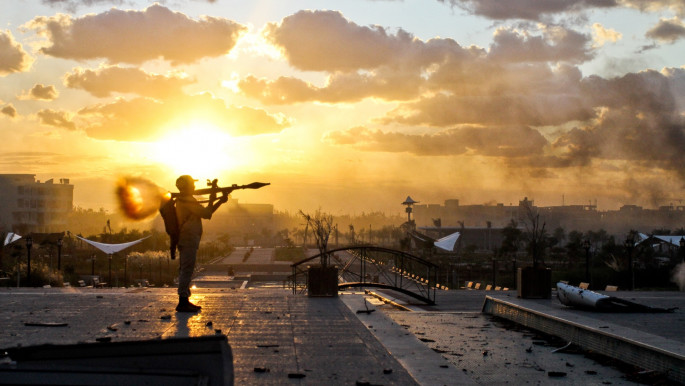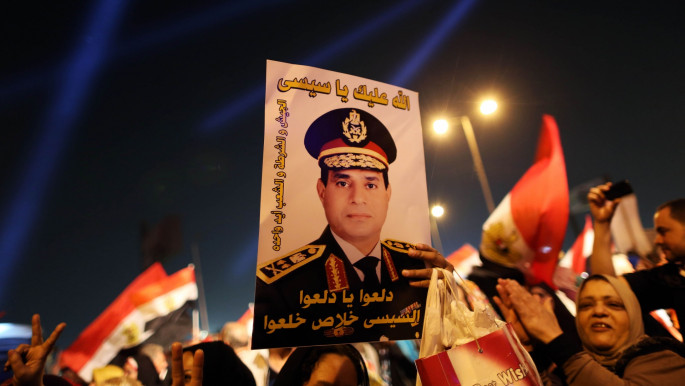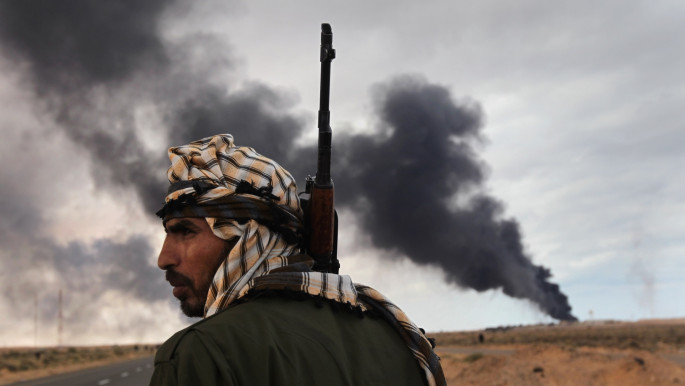Macron and Sisi: How France's geopolitical ambitions eclipse human rights abuses
However, not only did Macron refuse, he actively justified continued arms sales to Cairo amid the military regime's ongoing repression of civil society.
Egyptian security forces have crushed renewed anti-government protests since September and Sisi has overseen Egypt's worst crackdown on human rights in decades, with thousands of his critics behind bars. "I don't take lessons in how to lead from any other leader, just as I don't give lessons myself," Macron said.
Macron also guaranteed unconditional future French arms sales to Egypt despite the absence of any reforms on human rights, saying a removal of military support would weaken the Sisi regime's ability to fight "terrorism".
"I will not condition matters of defence and economic cooperation on these disagreements [over human rights]," Reuters quoted the French leader as saying.
This dismissal of human rights concerns reflects France's interests in maintaining geopolitical ties with Egypt, having established close relations with Sisi's regime since the 2013 military coup against Mohamed Morsi's democratically elected government. Furthermore, ties between both countries have grown increasingly close due to shared concerns over the conflict in Libya.
 |
Sisi has overseen Egypt's worst crackdown on human rights in decades, with thousands of his critics behind bars |  |
Human rights as an inconvenience
Macron previously acknowledged Egypt's repression of journalists in 2019, telling Sisi that human rights and stability can go together, but "because of [human rights violations] Egypt's image can find itself suffering." The French president has also recognised the regime's brutal treatment of dissidents.
However, as Macron has recently shown, these were empty words. The French president now views these human rights violations as a minor inconvenience to larger geopolitical concerns.
 |
|
| Read more: France and Turkey's growing rivalry in the Middle East |
Paris also has clear ideological reasons for backing Sisi. France has promoted its own unique version of 'secularism', which many say has clear Islamophobic undertones, including the French parliament's passing of new draft legislation which targets "Islamism".
Sisi meanwhile has presented his government as secular, stable and counter-extremist, particularly during his domestic crusade against the Muslim Brotherhood, which Cairo considers a "terrorist" faction.
During the meeting with Macron, Sisi once again employed anti-terrorism narratives, claiming that "the security of 100 million Egyptians falls upon me," while accusing the Muslim Brotherhood of exporting extremism to France and elsewhere globally. Macron also gifted Sisi with the country's highest award, the Legion d'Honneur.
'Stability' for economic interests
Reflecting Europe's broader attitude towards Egypt's Sisi, one anonymous European official once said "we know Sisi is bad for human rights. But he is good at killing terrorists." Sisi's regime is also seen as a crucial pillar for 'stability' to guarantee Western powers' economic influence in Egypt, and France is a key actor in this.
As far back as 2002, under the regime of Hosni Mubarak, Paris signed an $8 billion, 20-year agreement with Egypt to supply Gaz de France SA with 3.6 million tonnes of natural gas. France prefers to uphold the authoritarian status quo in Egypt through supporting Sisi, a military general like his predecessor Mubarak.
 |
The French president views Sisi's human rights violations as a minor inconvenience to larger geopolitical concerns |  |
Moreover, around 70 French companies were exploring opportunities to invest in Egypt in October. This comes after more investment deals were secured in 2019, as Macron urged French businesses to engage in Egypt as the two countries secured better deals with one another.
Geopolitical tensions between France and Turkey have also strengthened Paris' ties with Cairo. Macron may be more willing to back Sisi, given that Turkey was an ally of Morsi, and Sisi counteracts him as part of the United Arab Emirates (UAE) and Saudi Arabian axis. Moreover, the latest arms transactions come as France and Egypt may be gearing up to tighten their cooperation over Libya.
 |
|
| Read more: Biden and Sisi: A favourite dictator no more? |
Tensions over Libya
Egypt was a key supporter of Khalifa Haftar's self-styled Libyan National Army (LNA), seeking stability near its western border, while France has also covertly backed the warlord's campaign on Tripoli since April 2019. Both countries preferred a Sisi-like leader in Libya, which would also guarantee France's energy interests and secure its influence in the Eastern Mediterranean.
Though Turkey's military intervention since January 2020 has helped the internationally recognised Government of National Accord (GNA) successfully repel Haftar's offensive, friction between Haftar's backers and Ankara has continued.
France and Egypt have also strengthened their alliance amid Haftar's faltering campaign. Paris backed a Cairo-proposed peace initiative in June, and also supported Egypt's "right" to protect itself against Turkish forces moving closer to eastern Libya.
 |
Geopolitical tensions over Libya are evidently still far from resolved, and Egypt and France could gear up once again to counteract Turkey |  |
Moreover, the two countries now favour Aguila Saleh, the parliamentary speaker in the eastern Tobruk-based House of Representatives (HoR), as their new man to gain influence in Libya. This comes as talks for a ceasefire have developed since August, and advanced with the UN-backed 5+5 Joint Military Commission from October.
In the same month, French Ambassador to Egypt, Stephane Romatet, told Al Shorouk newspaper that "France and Egypt share the same view regarding ways to settle the Libyan crisis".
 |
|
| Read more: Divided Europe: How the West lost influence in Libya's war |
Despite ongoing international peace initiatives, Haftar's forces seized a Turkish vessel heading for Misrata on 7 December, according to LNA spokesperson Ahmed al-Mismari. Though an anonymous Turkish source claimed the vessel was delivering medical goods and that there were no weapons, the LNA clearly sees Turkey's presence in Libya as provocative.
There have been further indications that Turkey could take a greater role in Libya. Meanwhile, a GNA spokesperson stated last month that the Tripoli government's increasing security and military cooperation with Ankara is "legitimate and in accordance with international law."
Turkey last month also indicated it sought to pursue other developments, including expanding and improving Libya's Misrata airport, while President Recep Tayyip Erdogan described the ceasefire agreement as having "weak credibility."
Geopolitical tensions over Libya are evidently still far from resolved, and Egypt and France could gear up once again to counteract Turkey, even if it means disrupting the progression of peace initiatives.
Any escalation of tensions could lead to continued jostling for influence in Libya's parliament, or even worse, a proxy conflict, and have destabilising implications for Libya.
Jonathan Fenton-Harvey is a journalist and researcher who focuses on conflict, geopolitics and humanitarian issues in the Middle East and North Africa
Follow him on Twitter: @jfentonharvey





 Follow the Middle East's top stories in English at The New Arab on Google News
Follow the Middle East's top stories in English at The New Arab on Google News


